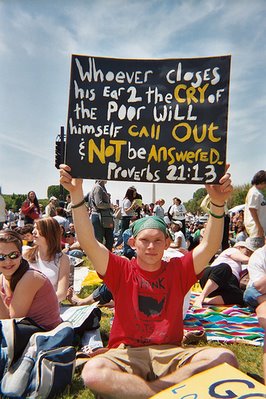 Eugene of Coalition for Darfur sent out links and snippets from two of Nicholas Kristof's recent columns from Chad, a region experiencing a spill-over of violence from Darfur, where since February 2003 an on-going genocide has left as many as 400,000 killed and 3.5 million driven from their homes and living in the squalor of displaced persons camps.
Eugene of Coalition for Darfur sent out links and snippets from two of Nicholas Kristof's recent columns from Chad, a region experiencing a spill-over of violence from Darfur, where since February 2003 an on-going genocide has left as many as 400,000 killed and 3.5 million driven from their homes and living in the squalor of displaced persons camps.First up, Poisoned arrows vs. machine guns:
Around this remote market town are janjaweed, the Sudanese-sponsored Arab militias that hunt down black Africans and shoot or rape them. The janjaweed are armed with AK-47s, grenade launchers and heavy machine guns mounted on pickup trucks.Next, Bandages and bayonets (heads up, the following contains a disturbing description):
Here in Koukou, the Africans are waiting for the attackers — with bows and arrows.
The international community has shamefully abandoned the people of eastern Chad, allowing the Darfur genocide to spread relentlessly. Incredibly, this year some 15,000 Chadians have sought security by fleeing into Darfur.
So the people in little Chadian towns like Koukou are left to themselves, and they have organized a self-defense force out of the town's 2,000 people. They have 12 hunting rifles, and every man has bows and arrows. Many also carry spears or swords.
It is an astonishing sight in the 21st century: Almost every male you meet here over the age of 12 carries a homemade bow and a quiver of arrows, just in case they come across marauders with machine guns. It is as crazy as it is courageous.
"I will try to defend myself with this bow and arrow," said Muhammad Hamid, a 40-year-old farmer walking down the path by the town. "If I die, that's O.K., but I will try to fight."
. . . . The people in Koukou and other towns here, with their bows and arrows, have the guts to stand up to genocide. I wish we did.
The crises in Darfur important to this blog. Why? As this blog has said many times before, God calls us to speak for those who have no voice (Proverbs 31:8-9)--and many in this region are just such people.In diplomatic circles, the Sudanese government can be wonderfully polished as it scoffs at accusations of genocide and denounces calls for U.N. peacekeepers in Darfur.
In isolated villages, everything is more straightforward — like the men in Sudanese military uniforms who on Tuesday captured Abdullah Idris, a 27-year-old father of two, in the fields as he was farming. They tried to shoot him in the chest, but the gun misfired.
"So they beat him to the ground," explained Osman Omar, a nephew of Mr. Abdullah who was one of several neighbors who recounted the events in the same way. "And then they used their bayonets to gouge out his eyes" . . . .
What can we do? If you don’t know enough about what’s going on, learn about crisis, and then tell others about it. Join a seventh grade social studies class in Highland Park, Illinois, that is undertaking a very creative project to help end the crisis in Darfur. Support organizations who are helping the millions of people displaced by the violence in Sudan and neighboring Uganda (where additional millions have been driven from their homes by the Lord's Resistance Army, a militia reportedly supported by the Sudan government). Check out Coalition for Darfur or Invisible Children or any of the following organizations: Doctors Without Borders, World Vision, Far Reaching Ministries, or Mennonite Central Committee. Also, you can locate your congressman here, and write a letter urging your representative to call for action (see Save Darfur’s background and talking points for more on what actions governments can take to end this crisis and a sample letter you can send to your representatives).
God will use our actions, no matter how small; give him something to work with.
If you’d like to learn more and find out what you can do to help end this crisis, visit World Vision, SaveDarfur, or Wikipedia.
(Image: by nickinglis at flickr; some rights reserved)